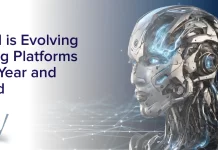
We spend 2 hours and 31 minutes daily on social media apps. Whether it is to share memes on instagram, debate on X (formerly known as twitter) or find jobs on linkedin. Entertainment, sharing information, or simply staying in touch with your loved ones, these social media apps help us in many ways. However, as these social media apps are like large banks of data, tech experts are consistently trying to improve these platforms for the betterment of common individuals.
Decentralization is one of the ways to improve the characteristics of social media apps. On one hand developers are trying to make these apps more engaging, on the other they are exploring decentralized apps. The reason behind this is to make social media apps more secure, less biased, and transparent. So here we are going to discuss; decentralized social media apps, what technology is contributing to it, and what protocols are used to achieve decentralization for social media.
What are Decentralized Social Media Apps?
A decentralized social media app or platform gives the users control over their data. Since people started to understand how social media apps work, there have been many debates about the data that is being utilized by social media platforms. Naturally it raised numerous ethical concerns and one of them was data privacy. People are currently slowly upgrading the way a social media app can be used. They are using it as an ecommerce platform, influencing other people, brand affiliation, and for sharing news rapidly too.
As more people utilize social media platforms for various purposes, the more data flows on a constant basis. Moreover a diverse set of data flows that is sorted, labeled, and utilized by developers to maintain the engagement quality of the platform. In this age where data is regarded as the new currency, valued by businesses and organizations, the concept of decentralized social media apps is a crucial revolution.
Definition
A decentralized social media platform does not operate on a single server owned or operated by a single entity. It uses individual servers that are independent and there is no single organization that owns the servers.
Explain like I am Five
Imagine if you are playing a game of hide and seek that has ‘an observer’ to determine the outcome and regulate the play. The ‘observer’ can set the rules, decide if you were caught, or cheated. It’s a bit unfair since we do not know the credibility of the observer.
Let’s shift the game scenario to decentralized servers. Here all the participants get to decide the outcome and make decisions through voting. If we eliminate ‘the observer’ then there are multiple benefits: one of them being that without the consent of players the rules of the game cannot be changed. This generates fairness and a single person does not hold the power to control or influence other players and the game.
Benefits
- When multiple entities have control over the data it eliminates the possibility of biasness. A strong affection or favoritism towards something will not result in influencing the decision of users.
- Data stored on multiple servers can be recovered easily eradicating the adverse effects of hacking or data loss.
- Lastly, ‘Freedom of speech’. A single authority cannot take every decision regarding censorship; this allows the users to post, share, and text more voluntarily.
Challenges Faced by Decentralized Social Media Apps
Every social media platform is trying to progress towards decentralization in full force. However there are obstacles and challenges which need to be addressed and overcome. Once developers can overthrow these tech and both non-tech barriers to make an innovative upgrade. Let’s learn about these challenges so we clearly grow with a strong foothold in this modern era.
Performance & Scalability
Currently almost every decentralized social media platform is working on blockchain technology. The technology consists of nodes to store and process data. The sluggishness could be due to many reasons:
- Inappropriate hardware
- Insufficient algorithms
- Data shuffling
- I/O Bottlenecks
- Data storage related issues
This is what makes the development part tricky as it affects the scalability and performance of the app for users. In the times of fast processors no person would like a slow performing application that cannot scale with the users expectations for new features.
Regulations & User Experience
The most important thing about social media apps is their users and the data that flows throughout the network. Here the kind of social media data apps we are talking about use surmount of data flowing through decentralized networks. This raises a simple yet crucial question of regulation and a peculiar set of data ethics need to be drafted. Maybe setting up a task force of content moderators could help to overcome this.
Decentralized social media apps have a lot of potential, they could include features that give freedom to users for controlling their data. Although the features that unlock true decentralization for users could lead to a complexity problem. As blockchain is a complex technology this will completely overrule the basic guideline of mobile app development: “To keep it simple, make it simple”.
One can perceive that both unknown regulatory compliance and complex user experience can affect the adoption rate of dSMApps (Decentralized social media Apps). Yet there are efforts being made to eradicate these challenges and make suck kind of apps commercial success.
There is so much to explore in decentralization and our blockchain or mobile app developers are trying to cover a lot for us. But what if people could contribute to an open source framework. Well through various protocols this can be a possibility.
Protocols used decentralized social media apps
There are mainly three protocols currently being explored that could be utilized by decentralized social media apps. These protocols help users and developers to achieve their goals in various ways. Some can be used for storage of data, others can be used for how data flows, and few can be used for how data is being operated on the network. However there are few that could use integration of other protocols to generate an entirely new one.
IPFS protocol
- InterPlanetary File System, a peer to peer file storage system. It is a decentralized system that allows the storing and retrieving of data.
- To do so the protocol utilizes content-addressing. The location of the network is not important here, as the file is assigned to a unique identifier.
- The protocol technology can be used for decentralized file sharing, website development, and content delivery network.
- Some of the benefits of IPFS are: resilience, decentralization, and efficient operation.
DIDs
- Decentralized Identifiers are modern identifiers innovated for the use of Web 3.0 and Web 4.0. This DID is assigned to an entity, which can be anything from a person, to an image.
- Consisting of two parts it allows the user to get alert if someone is accessing all the data present on the network.
- One part is the DID method, which overlooks how the identity is being used. Another one is the DID identifier, which just like its names suggest identifies the entity.
- Benefits of DID are: Security & Privacy, User control, Interoperability. It can be used to create a personalized unique identity on decentralized networks.
AT Protocol
- Now this is the most important one and quite peculiar in its own way. That’s because it is being developed and designed by a team of engineers who are trying to especially introduce decentralized social networking.
- The team says that it is a networking technology that will bring a never seen before upgrade to the way we interact on social media apps.
- The concept of Authentication Transfer Protocol (AT protocol) surfaced in October of 2022. A distinctive characteristic of the AT protocol is its concept of combining both IPFS and DIDs both with Lexicons.
- Features of the AT protocol are algorithmic choice, portable accounts, federated network. This will give users authority over their content, data, experience, and security.
Why are New Age Decentralized Protocols Important?
The importance of protocols can be discovered through comparing them with the centralized one that we are using today.
The Powerful Role of Various Technologies
1. Blockchain
Blockchain is the fountainhead technology for all the other solutions that we are exploring in the blog. Even decentralization is a technology derived from researching and developing solutions using blockchain. It is a distributed ledger, to store information and the information can be related to anything. Decentralized social media apps can use this feature for the benefits of users.
Across the globe every Blockchain development company is trying to implement full-fledged solutions like smart contracts too. Once acknowledged and explored by companies on a large basis, it will benefit from data transferring or data trading. These smart contracts allow users to make the social media platforms a store front for trading digital assets.
Benefits of Blockchain include secure payment transactions and ownership of digital assets like videos, images, artworks, files, etc. It helps to create a more transparent network for transferring documents from one party to another.
2. Web 3.0
Web 3.0 is considered the new generation internet that will enable decentralization. Well to say specifically Web3 is based on blockchain technology, it is being developed using the solutions that fall under the blockchain category.
The data flowing through the Web3 cannot be altered or erased without the permission that is what comes in effect here. To access the data one will need proper authorization, which is in the hands of users. A user can grant the permission but proper moderation is important here if the data becomes threatening in any way to the system or to the user. Development of Web 3.0 needs proper methodologies and resources so it will take some time to completely shift traditional Web users to a new gen web.
3. Artificial Intelligence
Automation and content generation for social media apps is the main forte for Artificial intelligence. But for the decentralized ones, how can an AI help right?. Sure there are many AI solutions that are coming to light in this modern era, but to reach the fundamental use is what we are trying to explain to you.
From content moderation to auto-fraud detection, AI can help decentralized social media apps to scale really well for the users. But the primary features of AI that are helping dSMapps are Data generation, Unbiased, AI algorithmic content suggestion. The technology plays a crucial role to moderate the content on a decentralized social media platform where freedom of speech is considered a new upgrade. Non-discriminating, fair decision making, and unbiased content flow on the platform is an important factor for which Artificial Intelligence will be utilized.
The Big Picture
Decentralized social media platforms need time to be commercialized for users. There are technologies that need to be tested and developed for it, protocols to be explored, and ethics to be implemented. But to look at the big picture for every decentralized social media app is helping users to contribute at an next gen interactive level.
Yes! The mission here is to unlock a whole another phase of social media, where it is not just made for users. Ultimately it needs to be made by the users too. Decentralized social media platforms are going to change how social media apps are utilized, maybe they will even redefine social networking fundamentally.





